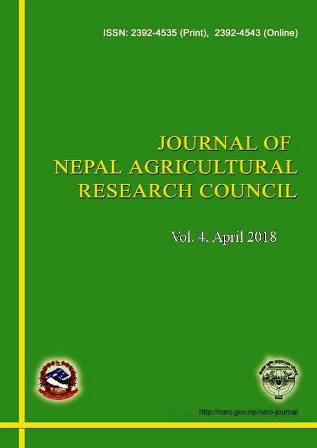Performance of Tomato with Organic Manures in Plastic Tunnel
DOI:
https://doi.org/10.3126/jnarc.v4i1.19681Keywords:
Plastic tunnel, Compost, Cattle urine, Soil nutrients, Tomato productivity, Recommended doses of chemical fertilizerAbstract
Tomato is one of the most demanded vegetable with increasing trend of commercial cultivation in Nepal. As it is the heavy feeder crop thus soil nutrient management has been always challenging. Since, in modern world organic production has been favored by consumers for many reasons thus we aimed to compare the efficacy of various compost, mineral fertilizers and their combinations in tomato production and soil productivity. For the purpose a field experiment in plastic tunnel was carried out in Horticulture Research Division, Khumaltar in two consecutive years (2014 and 2015). Srijana, a popular tomato hybrid among commercial producers, was purposively selected. Eight treatments (control, recommended doses of chemical fertilizers, compost 15 t ha-1 + cattle urine, compost 10 t ha-1 + cattle urine, compost 12.5 t ha-1 + cattle urine, compost 15 t ha-1 + 1/4 recommended dose of chemical fertilizers, compost 10 t ha-1 + ¾ recommended dose of chemical fertilizer and compost 12.5 t ha-1 + 1/2 recommended dose of chemical fertilizer) were laid out in randomized complete block design and replicated thrice. The result showed significant (p < 0.05) positive correlation between the plant height and yield of tomato. The treatment with compost dose of 12.5 t ha-1 with half dose of recommended dose of chemical fertilizers produced the highest incremental yield (85% increment) over other treatments followed by compost 15 t ha-1 with cattle urine. Addition of soil organic carbon, soil nitrogen, soil potassium by the increasing level of compost though not significant, but increment in carbon content, nitrogen content and potassium content of soil observed in successive years. For commercial producer at plastic tunnel, compost at the rate 12.5 t ha-1 with half dose of recommended level of chemical fertilizer (100:90:40 kg N:P:K ha-1) is recommended to apply in field, while for organic producer, application of 15 tha-1 compost with fermented cattle urine is recommended.
Downloads
Downloads
Published
How to Cite
Issue
Section
License
This license enables reusers to distribute, remix, adapt, and build upon the material in any medium or format for noncommercial purposes only, and only so long as attribution is given to the creator.




